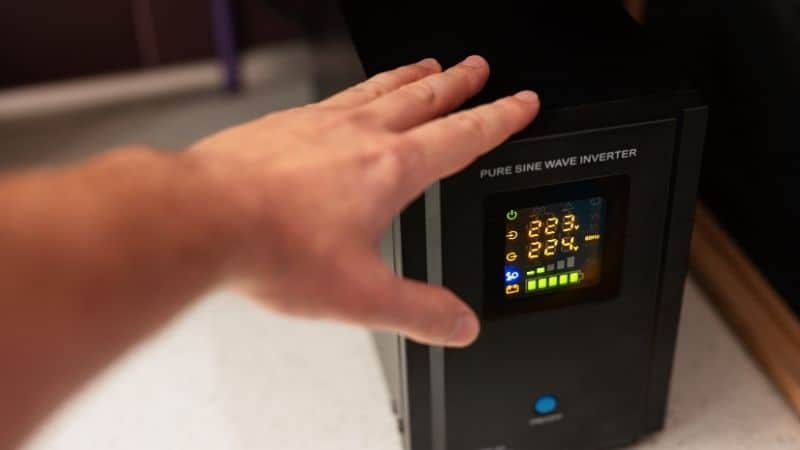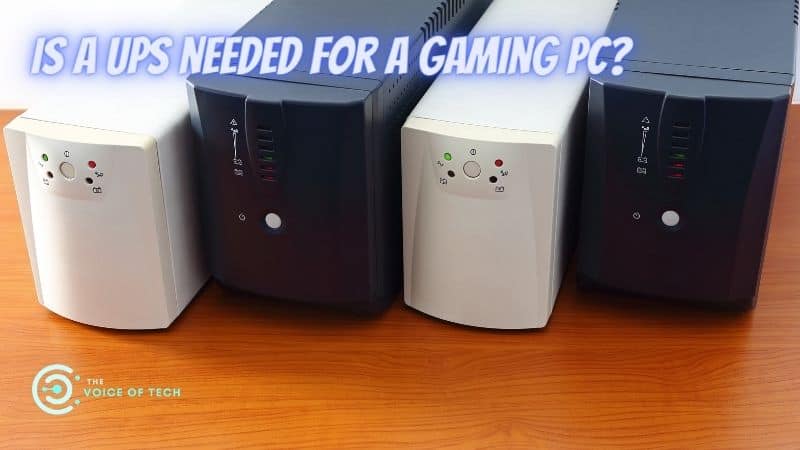
Expert Consulted: Adrian Gardiner. With 30+ years in the IT industry, I get frequent requests to repair, upgrade, and build a wide range of computers, including new gaming PCs. This experience has given me helpful knowledge that I can share to advise on whether a UPS is needed for a gaming PC.
A UPS or Uninterruptible Power Supply is a device that provides backup power to electronic devices, i.e., your computer, in case of a power outage or surge. For a gaming PC, a UPS can be a lifesaver as it can prevent data loss, protect components and peripherals, and ensure smooth operation during power fluctuations.
However, I do occasionally get asked whether a UPS is needed for a gaming PC. The quick answer to this question is:
A UPS for a gaming PC is not strictly necessary but is highly recommended. It provides a backup power source in case of sudden power outages, preventing potential data loss and hardware damage. Additionally, a UPS can offer protection against power surges and fluctuations, further safeguarding your gaming PC and extending its lifespan.
Read on to find out more about the little-known UPS device and how it can help you protect your computer equipment.
This post contains affiliate links. Click here to read our affiliate policy.
Is a UPS Needed for a Gaming PC? Find Out How it Can Help You
Unless you worked at some point for the IT department of a largish company, you probably won’t have come across the humble UPS device. Any business that values its main computers (servers) that represent the lifeblood of that company will know that a UPS is absolutely essential.
A UPS is effectively a smart battery that comprises the battery, an inverter, and a charger. The battery provides power to the inverter, which converts DC power to AC power and then to the computer.
The UPS can detect problems with the power supply (i.e., surges, spikes, and power fluctuations) or a power cut. In the event of surges and spikes, the UPS will protect your computers from damage.
In the event of a power outage and all of your computer equipment immediately shutting down with the potential for data corruption or hardware damage, the UPS will keep all equipment going.
At this point, the UPS will sound an alarm to let you know that it’s working to keep your computer equipment going for a specified amount of time.
This allows data to be backed up and the computers to be safely turned off without any risk to data or hardware.
The length of time a UPS can run after a power outage will vary considerably, depending on the equipment being protected and whether there are support personnel nearby (that can respond within the UPS battery run time).
Types of UPS
There are three main types of UPS, each designed for a particular category of usage and with a significant jump in cost, as listed below:
- Standby UPS – suitable for home / small office use.
- Line Interactive UPS – suitable for larger company/business use.
- Online UPS – suitable for much larger organizations like data centers, health organizations, and financial institutions, for example.
As this article addresses the potential need for a UPS to support a gaming computer, it will be focusing on the Standby UPS only.
UPS Form Factor
UPS devices come in a range of handy form factors designed to make it easy to slot one into the average home without taking up too much space. These form factors would include:
Desktop or Compact UPS – designed so that they can either fit on your computer desk or under it. Some also come with the option to wall mount. Plug outlets are usually placed on the top flat surface of the UPS.
Mini-Tower UPS – tall and slim, these UPS devices stand upright and, again, can go on or under your desk or wherever you have space. The plug outlets are positioned on the rear of the device.
Should You Use a UPS for Your Gaming Computer?

Whether to use a UPS for your gaming computer will depend on how much value you place on your gaming equipment and the quality/reliability of your power supply.
As an example, I had one customer a few years back who kept having power outages because of an above-ground power line that was regularly hit by local swans as they took off to fly from one lake to another.
They had no UPS until I recommended one after the third outage in the space of 6 months (power outages were rare where they lived).
The result of the three outages was a dead PSU (power supply unit) on their computer, plus a damaged hard drive with data loss (fortunately, they had a data backup)!
For use with a gaming PC (or any personal computer), the cost of a UPS is not going to be huge, starting at around $70 or so for an APC BX500CI (500VA / 300w – make sure you size your UPS correctly for your system – see below), but the peace of mind it brings would definitely be worth it.
How to Size and Select Your UPS
It’s very important to size your UPS correctly if you want it to protect your equipment in the event of a power outage. To correctly size and select your UPS, I’ve outlined the key steps in the following table:
| 1. | List All Equipment: List all the equipment you intend to connect to the UPS. This includes the computer itself, monitors, routers, external hard drives, and any other peripherals that need power protection. |
| 2. | Determine Power Consumption: Check the power rating of each piece of equipment requiring protection. This is usually given in watts (W) and can be found on the device itself, its power adapter, or in the user manual. If the rating is given in volts (V) and amps (A), multiply them together to get the wattage: Watts = Volts x Amps |
| 3. | Total Power Requirement: Sum up the wattage of all the equipment to get the total power consumption / load. |
| 4. | Add a Safety Margin: It’s a good practice to add a safety margin to ensure the UPS can handle any power spikes or if you add more devices in the future. A common margin is 20-25%. Multiply your total power requirement by 1.25 (for a 25% margin): Required UPS capacity = Total power requirement x 1.25 |
| 5. | Runtime: Decide how long you want your equipment to run during a power outage. The more runtime you want, the larger the battery capacity you’ll need. Basic UPS units might offer 5-10 minutes, which is usually enough to save work and safely shut down. If you need longer, look for units with extended runtime capabilities. |
| 6. | Additional Features: Consider any additional features you might want, such as: Surge protection (usually a standard feature) Automatic Voltage Regulation (AVR) (usually a standard feature) Connectivity options like USB or Ethernet for monitoring and control Audible alarms or LCD displays |
| 7. | Choose a UPS: With your required UPS capacity in mind, along with the desired runtime and features, you can now choose a UPS. Always opt for a reputable brand (i.e., APC or CyberPower) and ensure the UPS’s wattage rating meets or exceeds your calculated requirement. |
| 8. | Regular Maintenance: Like all batteries, those in a UPS degrade over time. It’s essential to check the battery’s health periodically and replace it when needed. |
UPS Key Features
Here is a list of the main features provided by a UPS and how they can help protect your computer equipment.
- Automatic Voltage Regulation (AVR) to protect against power surges and voltage fluctuations.
- Uninterrupted power supply.
- Power Factor – this is a measure of the efficiency of the UPS, and the higher, the better (results in a more efficient and stable power supply to your PC). Expressed as a percentage, a figure of 0.9 or better is good.
- Compatibility with Computers, Laptops, Consoles, Routers, Modems, Monitors, and many other peripherals.
- Protection from lightning.
- You can usually set up your computer to automatically turn off if the battery level becomes too low.
Note that some more expensive UPS devices will come with more features, including, for example, an LCD display giving status information, Eco Mode to save energy usage when the UPS is not actively providing backup power or remote monitoring/management.
UPS Disadvantages
I’ve talked a lot about all the wonderful advantages, but there are a few disadvantages of having a UPS that are worth taking note of:
- Some can make a small amount of noise. This noise can be a soft buzzing, hissing, gentle hum, or fan noise. Usually, it’s hardly noticeable, but some might be more sensitive to this than others due to the changes in pitch. Excessive noise could be coming from the cooling fan indicating the need for maintenance.
- Although manufacturers will usually state a battery life of around 3 – 5 years, depending on the quality of the battery and how frequently it’s been used, the actual life is often found to be in the 2 -3 year range.
- Not all UPS devices are designed for easy battery replacement, meaning you may have to replace the complete UPS device.
- The alarm is reported to be loud on some models when it comes on after losing power or it’s switched off.
Key Takeaway
If your local power supply is known to have regular issues, protecting your
computer with a UPS is a very good idea
Conclusion
While not strictly necessary for most users, if you have an unreliable power supply that’s prone to outages, surges, or spikes, a UPS is well worth the investment.
Regular supply issues can definitely have a negative impact on your computer equipment, resulting in potential data corruption and/or component damage.
For the sake of a relatively small investment, if your power supply has ever let you down, I know what I’d do. I hope my article has helped you in deciding on whether a UPS would be right for you.
Image Attribution and Licensing
Main image: (Canva Pro)
#1: Pure Sine Wave Inverter (by ASphotostudio, Canva Pro)

